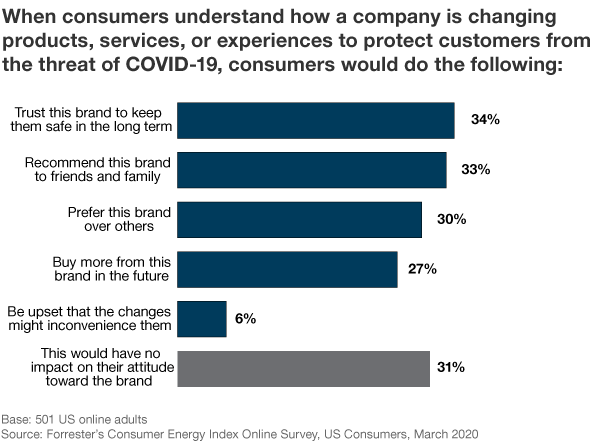The adage says that character is what you do when no one’s watching. But as the internet’s gargantuan reach brings radical transparency to the critical eyes of values-based empowered customers, what you do when everyone is watching is even more important. And during a crisis like COVID-19, vigilance is at its peak.
In addition to following precautions mandated by the government, businesses are forced to make tough decisions about how to operate amid the chaos. Unprecedented levels of uncertainty paired with a rapid flow of new information means leaders forge ahead with neither a template to follow, nor the luxury of pondering every decision. Yet their choices and actions expose the company’s priorities and values to ever-watchful consumers.
To the business leaders navigating these decisions, our guidance is clear: Treat your employees and customers as your North Star. Show customers how you are genuinely looking out for their well-being — even if that requires reexamining your own habits and tactics of business decision making.
Why? Because consumers are seeking out brands that care: At this moment, 52% of US online adults prefer to buy from companies that show how they are protecting customers against the threat of COVID-19. Yet consumer skepticism means their search is in vain: Only 24% of US online adults trust that companies are currently putting their health and well-being first when making business decisions. When consumers find those brands that prioritize the customer, they reward the companies with preference, advocacy, spend, and — the most precious currency of today — trust:
Starbucks provides a model example. Even though the company is driven by the value of sustainability (we’ve witnessed its commitment to removing plastic straws, adhering to ethically sourced coffee, and more), the coffee giant boldly reversed a values-driven practice in the name of the customer: In anticipation of a rising COVID-19 count, Starbucks banned the use of reusable and “for here” cups. Starbucks’ move proves that the brand is willing to reassess its own practices even if it means taking a financial hit — the company will still honor the discount for customers who bring personal cups to the register — to look out for employees and consumers.
Customer obsession is not only about giving customers what they want; it’s about constantly reassessing the experience you deliver by asking the question, “Does this demonstrate a commitment to my customers’ well-being?” Consider your customers’ current emotional state and your capability to contribute to their emotional or physical well-being to determine how to illustrate your commitment. As COVID-19 weighs down on consumers’ emotional and physical well-being, your brand has an opportunity, and perhaps an obligation, to step up.
Questions, comments, or ideas? I look forward to sharing more data detail and discussing via inquiry.
